Global Mobility Handbook Project: Characteristics of Chinese Culture
VerifiedAdded on 2022/11/17
|9
|3631
|380
AI Summary
This article discusses the characteristics of Chinese culture in the context of the Global Mobility Handbook Project. It highlights the challenges faced by human resource management in China due to the culture of promoting cliques, fear of authority, and high power distance characteristic. The article also evaluates the impact of these characteristics on the development of a team working culture, individual abilities and potentials of employees, and the overall success of the organization.
Contribute Materials
Your contribution can guide someone’s learning journey. Share your
documents today.
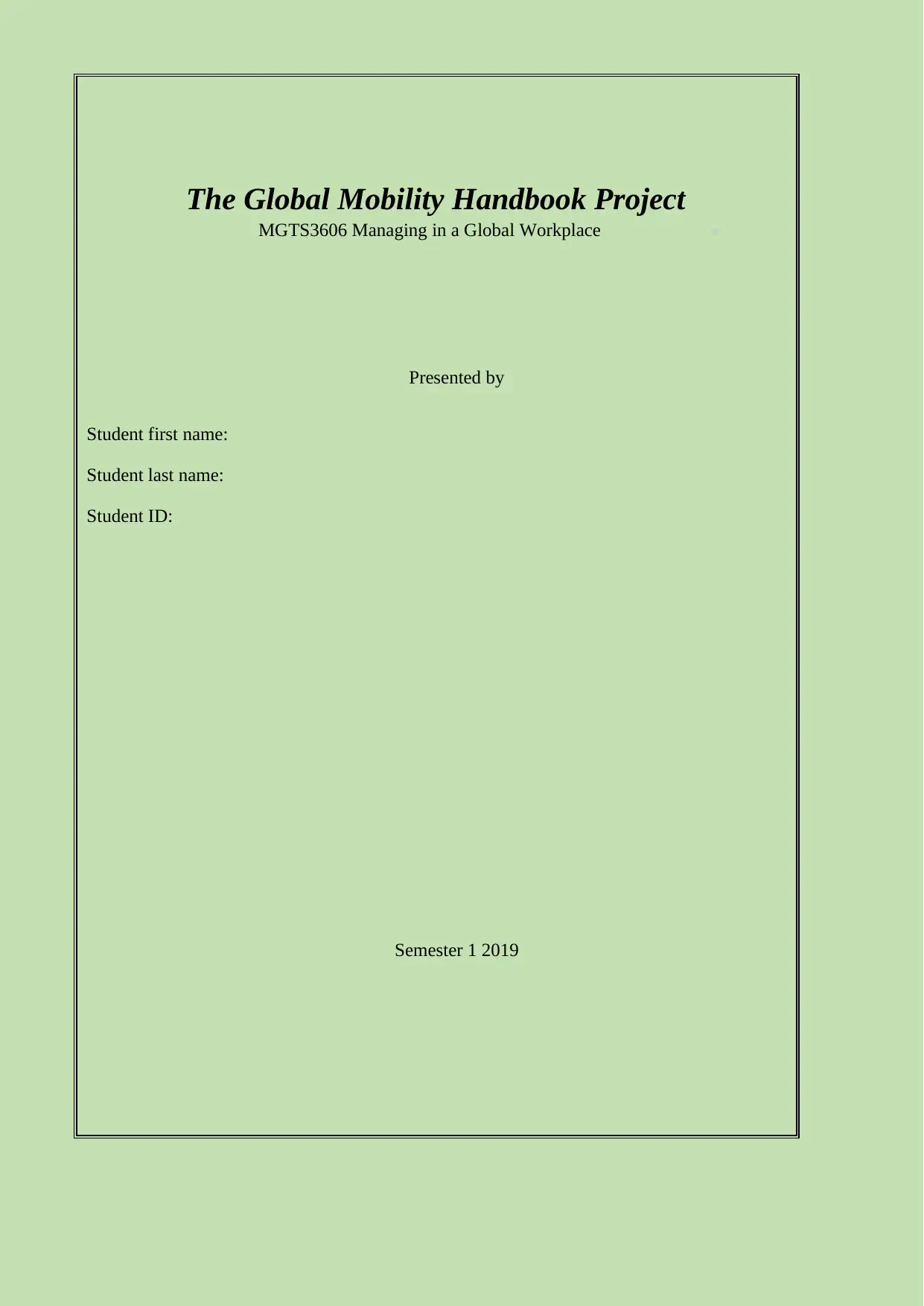
The Global Mobility Handbook Project
MGTS3606 Managing in a Global Workplace
Presented by
Student first name:
Student last name:
Student ID:
Semester 1 2019
MGTS3606 Managing in a Global Workplace
Presented by
Student first name:
Student last name:
Student ID:
Semester 1 2019
Secure Best Marks with AI Grader
Need help grading? Try our AI Grader for instant feedback on your assignments.
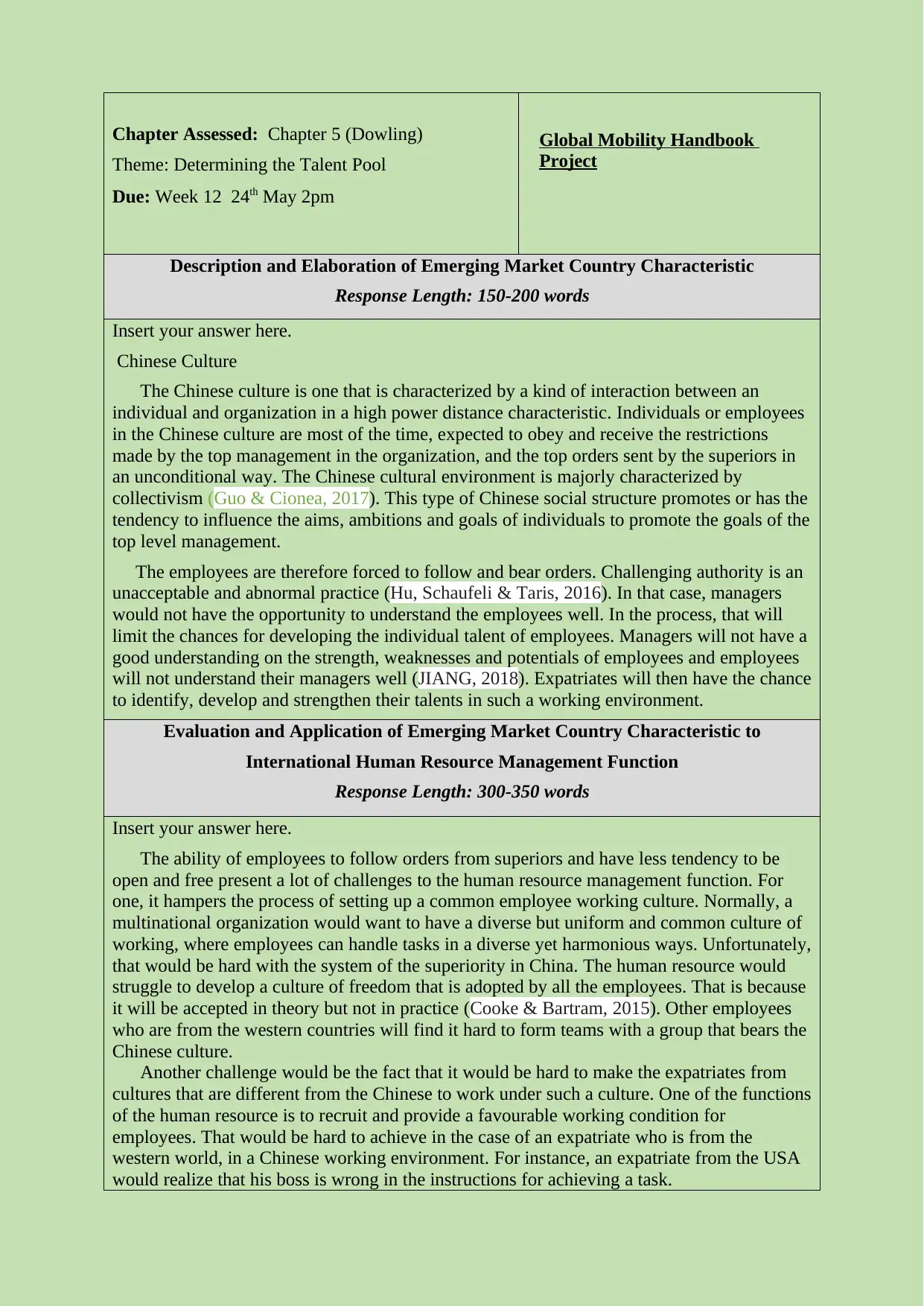
Chapter Assessed: Chapter 5 (Dowling)
Theme: Determining the Talent Pool
Due: Week 12 24th May 2pm
Global Mobility Handbook
Project
Description and Elaboration of Emerging Market Country Characteristic
Response Length: 150-200 words
Insert your answer here.
Chinese Culture
The Chinese culture is one that is characterized by a kind of interaction between an
individual and organization in a high power distance characteristic. Individuals or employees
in the Chinese culture are most of the time, expected to obey and receive the restrictions
made by the top management in the organization, and the top orders sent by the superiors in
an unconditional way. The Chinese cultural environment is majorly characterized by
collectivism (Guo & Cionea, 2017). This type of Chinese social structure promotes or has the
tendency to influence the aims, ambitions and goals of individuals to promote the goals of the
top level management.
The employees are therefore forced to follow and bear orders. Challenging authority is an
unacceptable and abnormal practice (Hu, Schaufeli & Taris, 2016). In that case, managers
would not have the opportunity to understand the employees well. In the process, that will
limit the chances for developing the individual talent of employees. Managers will not have a
good understanding on the strength, weaknesses and potentials of employees and employees
will not understand their managers well (JIANG, 2018). Expatriates will then have the chance
to identify, develop and strengthen their talents in such a working environment.
Evaluation and Application of Emerging Market Country Characteristic to
International Human Resource Management Function
Response Length: 300-350 words
Insert your answer here.
The ability of employees to follow orders from superiors and have less tendency to be
open and free present a lot of challenges to the human resource management function. For
one, it hampers the process of setting up a common employee working culture. Normally, a
multinational organization would want to have a diverse but uniform and common culture of
working, where employees can handle tasks in a diverse yet harmonious ways. Unfortunately,
that would be hard with the system of the superiority in China. The human resource would
struggle to develop a culture of freedom that is adopted by all the employees. That is because
it will be accepted in theory but not in practice (Cooke & Bartram, 2015). Other employees
who are from the western countries will find it hard to form teams with a group that bears the
Chinese culture.
Another challenge would be the fact that it would be hard to make the expatriates from
cultures that are different from the Chinese to work under such a culture. One of the functions
of the human resource is to recruit and provide a favourable working condition for
employees. That would be hard to achieve in the case of an expatriate who is from the
western world, in a Chinese working environment. For instance, an expatriate from the USA
would realize that his boss is wrong in the instructions for achieving a task.
Theme: Determining the Talent Pool
Due: Week 12 24th May 2pm
Global Mobility Handbook
Project
Description and Elaboration of Emerging Market Country Characteristic
Response Length: 150-200 words
Insert your answer here.
Chinese Culture
The Chinese culture is one that is characterized by a kind of interaction between an
individual and organization in a high power distance characteristic. Individuals or employees
in the Chinese culture are most of the time, expected to obey and receive the restrictions
made by the top management in the organization, and the top orders sent by the superiors in
an unconditional way. The Chinese cultural environment is majorly characterized by
collectivism (Guo & Cionea, 2017). This type of Chinese social structure promotes or has the
tendency to influence the aims, ambitions and goals of individuals to promote the goals of the
top level management.
The employees are therefore forced to follow and bear orders. Challenging authority is an
unacceptable and abnormal practice (Hu, Schaufeli & Taris, 2016). In that case, managers
would not have the opportunity to understand the employees well. In the process, that will
limit the chances for developing the individual talent of employees. Managers will not have a
good understanding on the strength, weaknesses and potentials of employees and employees
will not understand their managers well (JIANG, 2018). Expatriates will then have the chance
to identify, develop and strengthen their talents in such a working environment.
Evaluation and Application of Emerging Market Country Characteristic to
International Human Resource Management Function
Response Length: 300-350 words
Insert your answer here.
The ability of employees to follow orders from superiors and have less tendency to be
open and free present a lot of challenges to the human resource management function. For
one, it hampers the process of setting up a common employee working culture. Normally, a
multinational organization would want to have a diverse but uniform and common culture of
working, where employees can handle tasks in a diverse yet harmonious ways. Unfortunately,
that would be hard with the system of the superiority in China. The human resource would
struggle to develop a culture of freedom that is adopted by all the employees. That is because
it will be accepted in theory but not in practice (Cooke & Bartram, 2015). Other employees
who are from the western countries will find it hard to form teams with a group that bears the
Chinese culture.
Another challenge would be the fact that it would be hard to make the expatriates from
cultures that are different from the Chinese to work under such a culture. One of the functions
of the human resource is to recruit and provide a favourable working condition for
employees. That would be hard to achieve in the case of an expatriate who is from the
western world, in a Chinese working environment. For instance, an expatriate from the USA
would realize that his boss is wrong in the instructions for achieving a task.
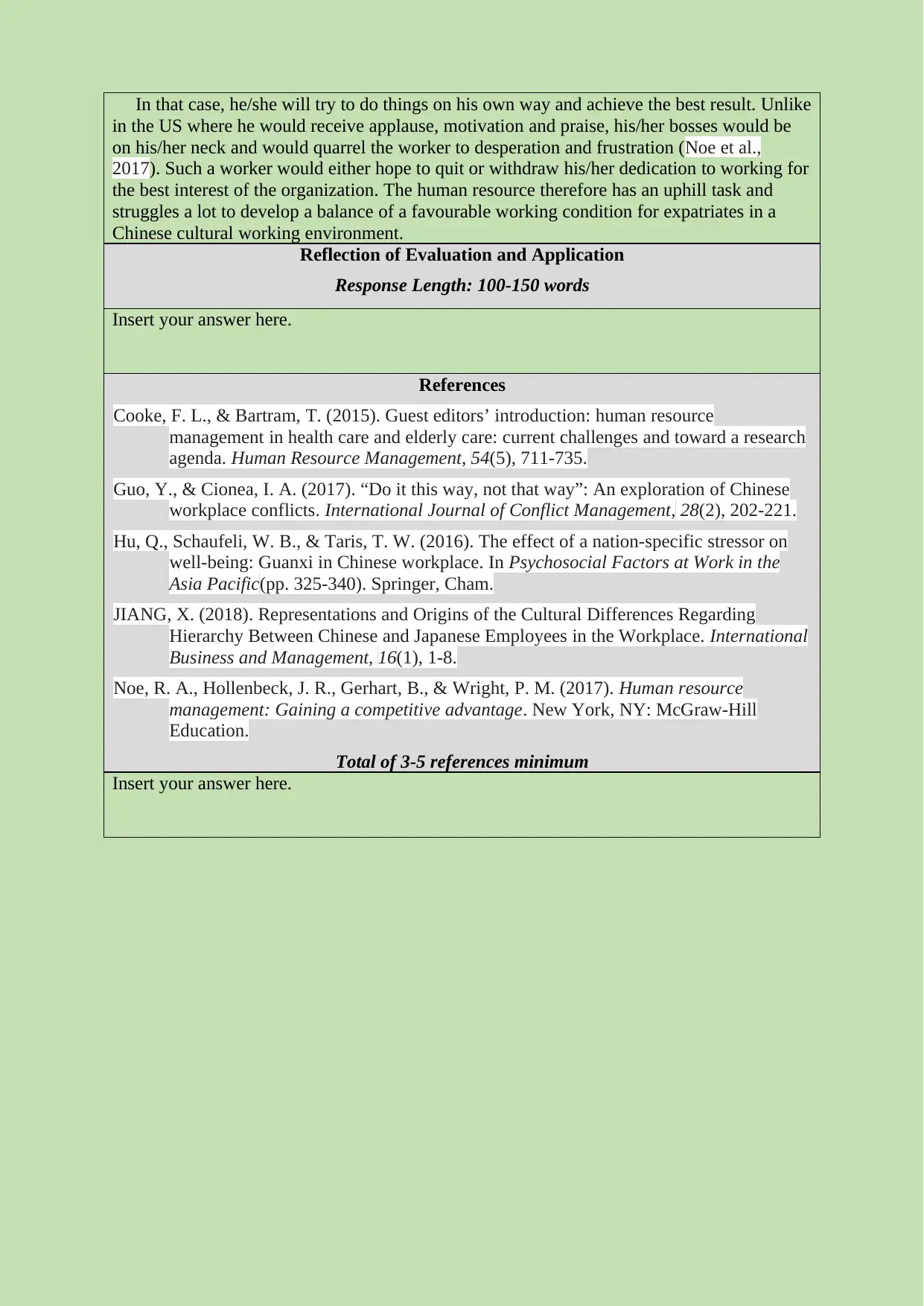
In that case, he/she will try to do things on his own way and achieve the best result. Unlike
in the US where he would receive applause, motivation and praise, his/her bosses would be
on his/her neck and would quarrel the worker to desperation and frustration (Noe et al.,
2017). Such a worker would either hope to quit or withdraw his/her dedication to working for
the best interest of the organization. The human resource therefore has an uphill task and
struggles a lot to develop a balance of a favourable working condition for expatriates in a
Chinese cultural working environment.
Reflection of Evaluation and Application
Response Length: 100-150 words
Insert your answer here.
References
Cooke, F. L., & Bartram, T. (2015). Guest editors’ introduction: human resource
management in health care and elderly care: current challenges and toward a research
agenda. Human Resource Management, 54(5), 711-735.
Guo, Y., & Cionea, I. A. (2017). “Do it this way, not that way”: An exploration of Chinese
workplace conflicts. International Journal of Conflict Management, 28(2), 202-221.
Hu, Q., Schaufeli, W. B., & Taris, T. W. (2016). The effect of a nation-specific stressor on
well-being: Guanxi in Chinese workplace. In Psychosocial Factors at Work in the
Asia Pacific(pp. 325-340). Springer, Cham.
JIANG, X. (2018). Representations and Origins of the Cultural Differences Regarding
Hierarchy Between Chinese and Japanese Employees in the Workplace. International
Business and Management, 16(1), 1-8.
Noe, R. A., Hollenbeck, J. R., Gerhart, B., & Wright, P. M. (2017). Human resource
management: Gaining a competitive advantage. New York, NY: McGraw-Hill
Education.
Total of 3-5 references minimum
Insert your answer here.
in the US where he would receive applause, motivation and praise, his/her bosses would be
on his/her neck and would quarrel the worker to desperation and frustration (Noe et al.,
2017). Such a worker would either hope to quit or withdraw his/her dedication to working for
the best interest of the organization. The human resource therefore has an uphill task and
struggles a lot to develop a balance of a favourable working condition for expatriates in a
Chinese cultural working environment.
Reflection of Evaluation and Application
Response Length: 100-150 words
Insert your answer here.
References
Cooke, F. L., & Bartram, T. (2015). Guest editors’ introduction: human resource
management in health care and elderly care: current challenges and toward a research
agenda. Human Resource Management, 54(5), 711-735.
Guo, Y., & Cionea, I. A. (2017). “Do it this way, not that way”: An exploration of Chinese
workplace conflicts. International Journal of Conflict Management, 28(2), 202-221.
Hu, Q., Schaufeli, W. B., & Taris, T. W. (2016). The effect of a nation-specific stressor on
well-being: Guanxi in Chinese workplace. In Psychosocial Factors at Work in the
Asia Pacific(pp. 325-340). Springer, Cham.
JIANG, X. (2018). Representations and Origins of the Cultural Differences Regarding
Hierarchy Between Chinese and Japanese Employees in the Workplace. International
Business and Management, 16(1), 1-8.
Noe, R. A., Hollenbeck, J. R., Gerhart, B., & Wright, P. M. (2017). Human resource
management: Gaining a competitive advantage. New York, NY: McGraw-Hill
Education.
Total of 3-5 references minimum
Insert your answer here.
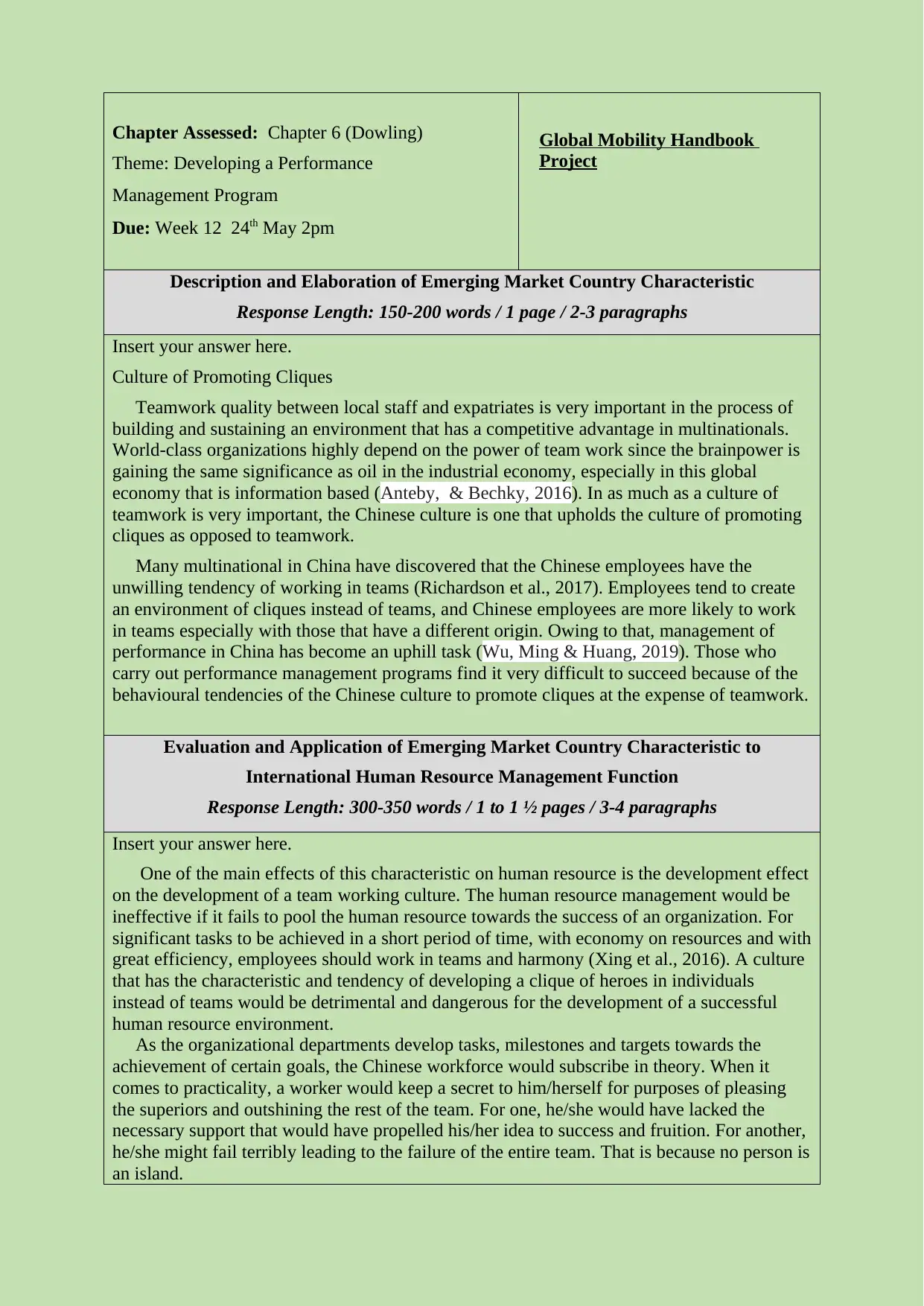
Chapter Assessed: Chapter 6 (Dowling)
Theme: Developing a Performance
Management Program
Due: Week 12 24th May 2pm
Global Mobility Handbook
Project
Description and Elaboration of Emerging Market Country Characteristic
Response Length: 150-200 words / 1 page / 2-3 paragraphs
Insert your answer here.
Culture of Promoting Cliques
Teamwork quality between local staff and expatriates is very important in the process of
building and sustaining an environment that has a competitive advantage in multinationals.
World-class organizations highly depend on the power of team work since the brainpower is
gaining the same significance as oil in the industrial economy, especially in this global
economy that is information based (Anteby, & Bechky, 2016). In as much as a culture of
teamwork is very important, the Chinese culture is one that upholds the culture of promoting
cliques as opposed to teamwork.
Many multinational in China have discovered that the Chinese employees have the
unwilling tendency of working in teams (Richardson et al., 2017). Employees tend to create
an environment of cliques instead of teams, and Chinese employees are more likely to work
in teams especially with those that have a different origin. Owing to that, management of
performance in China has become an uphill task (Wu, Ming & Huang, 2019). Those who
carry out performance management programs find it very difficult to succeed because of the
behavioural tendencies of the Chinese culture to promote cliques at the expense of teamwork.
Evaluation and Application of Emerging Market Country Characteristic to
International Human Resource Management Function
Response Length: 300-350 words / 1 to 1 ½ pages / 3-4 paragraphs
Insert your answer here.
One of the main effects of this characteristic on human resource is the development effect
on the development of a team working culture. The human resource management would be
ineffective if it fails to pool the human resource towards the success of an organization. For
significant tasks to be achieved in a short period of time, with economy on resources and with
great efficiency, employees should work in teams and harmony (Xing et al., 2016). A culture
that has the characteristic and tendency of developing a clique of heroes in individuals
instead of teams would be detrimental and dangerous for the development of a successful
human resource environment.
As the organizational departments develop tasks, milestones and targets towards the
achievement of certain goals, the Chinese workforce would subscribe in theory. When it
comes to practicality, a worker would keep a secret to him/herself for purposes of pleasing
the superiors and outshining the rest of the team. For one, he/she would have lacked the
necessary support that would have propelled his/her idea to success and fruition. For another,
he/she might fail terribly leading to the failure of the entire team. That is because no person is
an island.
Theme: Developing a Performance
Management Program
Due: Week 12 24th May 2pm
Global Mobility Handbook
Project
Description and Elaboration of Emerging Market Country Characteristic
Response Length: 150-200 words / 1 page / 2-3 paragraphs
Insert your answer here.
Culture of Promoting Cliques
Teamwork quality between local staff and expatriates is very important in the process of
building and sustaining an environment that has a competitive advantage in multinationals.
World-class organizations highly depend on the power of team work since the brainpower is
gaining the same significance as oil in the industrial economy, especially in this global
economy that is information based (Anteby, & Bechky, 2016). In as much as a culture of
teamwork is very important, the Chinese culture is one that upholds the culture of promoting
cliques as opposed to teamwork.
Many multinational in China have discovered that the Chinese employees have the
unwilling tendency of working in teams (Richardson et al., 2017). Employees tend to create
an environment of cliques instead of teams, and Chinese employees are more likely to work
in teams especially with those that have a different origin. Owing to that, management of
performance in China has become an uphill task (Wu, Ming & Huang, 2019). Those who
carry out performance management programs find it very difficult to succeed because of the
behavioural tendencies of the Chinese culture to promote cliques at the expense of teamwork.
Evaluation and Application of Emerging Market Country Characteristic to
International Human Resource Management Function
Response Length: 300-350 words / 1 to 1 ½ pages / 3-4 paragraphs
Insert your answer here.
One of the main effects of this characteristic on human resource is the development effect
on the development of a team working culture. The human resource management would be
ineffective if it fails to pool the human resource towards the success of an organization. For
significant tasks to be achieved in a short period of time, with economy on resources and with
great efficiency, employees should work in teams and harmony (Xing et al., 2016). A culture
that has the characteristic and tendency of developing a clique of heroes in individuals
instead of teams would be detrimental and dangerous for the development of a successful
human resource environment.
As the organizational departments develop tasks, milestones and targets towards the
achievement of certain goals, the Chinese workforce would subscribe in theory. When it
comes to practicality, a worker would keep a secret to him/herself for purposes of pleasing
the superiors and outshining the rest of the team. For one, he/she would have lacked the
necessary support that would have propelled his/her idea to success and fruition. For another,
he/she might fail terribly leading to the failure of the entire team. That is because no person is
an island.
Secure Best Marks with AI Grader
Need help grading? Try our AI Grader for instant feedback on your assignments.
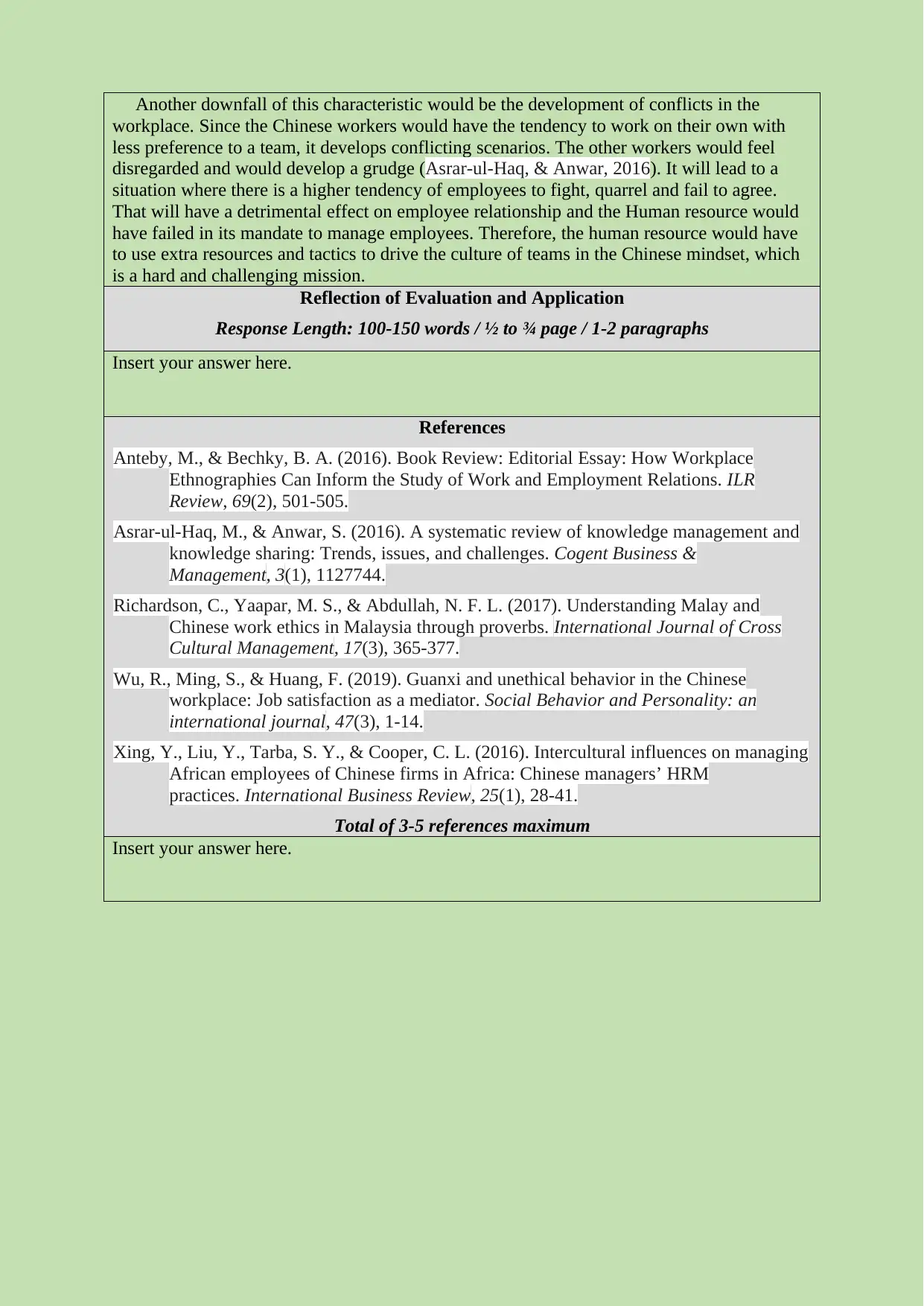
Another downfall of this characteristic would be the development of conflicts in the
workplace. Since the Chinese workers would have the tendency to work on their own with
less preference to a team, it develops conflicting scenarios. The other workers would feel
disregarded and would develop a grudge (Asrar-ul-Haq, & Anwar, 2016). It will lead to a
situation where there is a higher tendency of employees to fight, quarrel and fail to agree.
That will have a detrimental effect on employee relationship and the Human resource would
have failed in its mandate to manage employees. Therefore, the human resource would have
to use extra resources and tactics to drive the culture of teams in the Chinese mindset, which
is a hard and challenging mission.
Reflection of Evaluation and Application
Response Length: 100-150 words / ½ to ¾ page / 1-2 paragraphs
Insert your answer here.
References
Anteby, M., & Bechky, B. A. (2016). Book Review: Editorial Essay: How Workplace
Ethnographies Can Inform the Study of Work and Employment Relations. ILR
Review, 69(2), 501-505.
Asrar-ul-Haq, M., & Anwar, S. (2016). A systematic review of knowledge management and
knowledge sharing: Trends, issues, and challenges. Cogent Business &
Management, 3(1), 1127744.
Richardson, C., Yaapar, M. S., & Abdullah, N. F. L. (2017). Understanding Malay and
Chinese work ethics in Malaysia through proverbs. International Journal of Cross
Cultural Management, 17(3), 365-377.
Wu, R., Ming, S., & Huang, F. (2019). Guanxi and unethical behavior in the Chinese
workplace: Job satisfaction as a mediator. Social Behavior and Personality: an
international journal, 47(3), 1-14.
Xing, Y., Liu, Y., Tarba, S. Y., & Cooper, C. L. (2016). Intercultural influences on managing
African employees of Chinese firms in Africa: Chinese managers’ HRM
practices. International Business Review, 25(1), 28-41.
Total of 3-5 references maximum
Insert your answer here.
workplace. Since the Chinese workers would have the tendency to work on their own with
less preference to a team, it develops conflicting scenarios. The other workers would feel
disregarded and would develop a grudge (Asrar-ul-Haq, & Anwar, 2016). It will lead to a
situation where there is a higher tendency of employees to fight, quarrel and fail to agree.
That will have a detrimental effect on employee relationship and the Human resource would
have failed in its mandate to manage employees. Therefore, the human resource would have
to use extra resources and tactics to drive the culture of teams in the Chinese mindset, which
is a hard and challenging mission.
Reflection of Evaluation and Application
Response Length: 100-150 words / ½ to ¾ page / 1-2 paragraphs
Insert your answer here.
References
Anteby, M., & Bechky, B. A. (2016). Book Review: Editorial Essay: How Workplace
Ethnographies Can Inform the Study of Work and Employment Relations. ILR
Review, 69(2), 501-505.
Asrar-ul-Haq, M., & Anwar, S. (2016). A systematic review of knowledge management and
knowledge sharing: Trends, issues, and challenges. Cogent Business &
Management, 3(1), 1127744.
Richardson, C., Yaapar, M. S., & Abdullah, N. F. L. (2017). Understanding Malay and
Chinese work ethics in Malaysia through proverbs. International Journal of Cross
Cultural Management, 17(3), 365-377.
Wu, R., Ming, S., & Huang, F. (2019). Guanxi and unethical behavior in the Chinese
workplace: Job satisfaction as a mediator. Social Behavior and Personality: an
international journal, 47(3), 1-14.
Xing, Y., Liu, Y., Tarba, S. Y., & Cooper, C. L. (2016). Intercultural influences on managing
African employees of Chinese firms in Africa: Chinese managers’ HRM
practices. International Business Review, 25(1), 28-41.
Total of 3-5 references maximum
Insert your answer here.
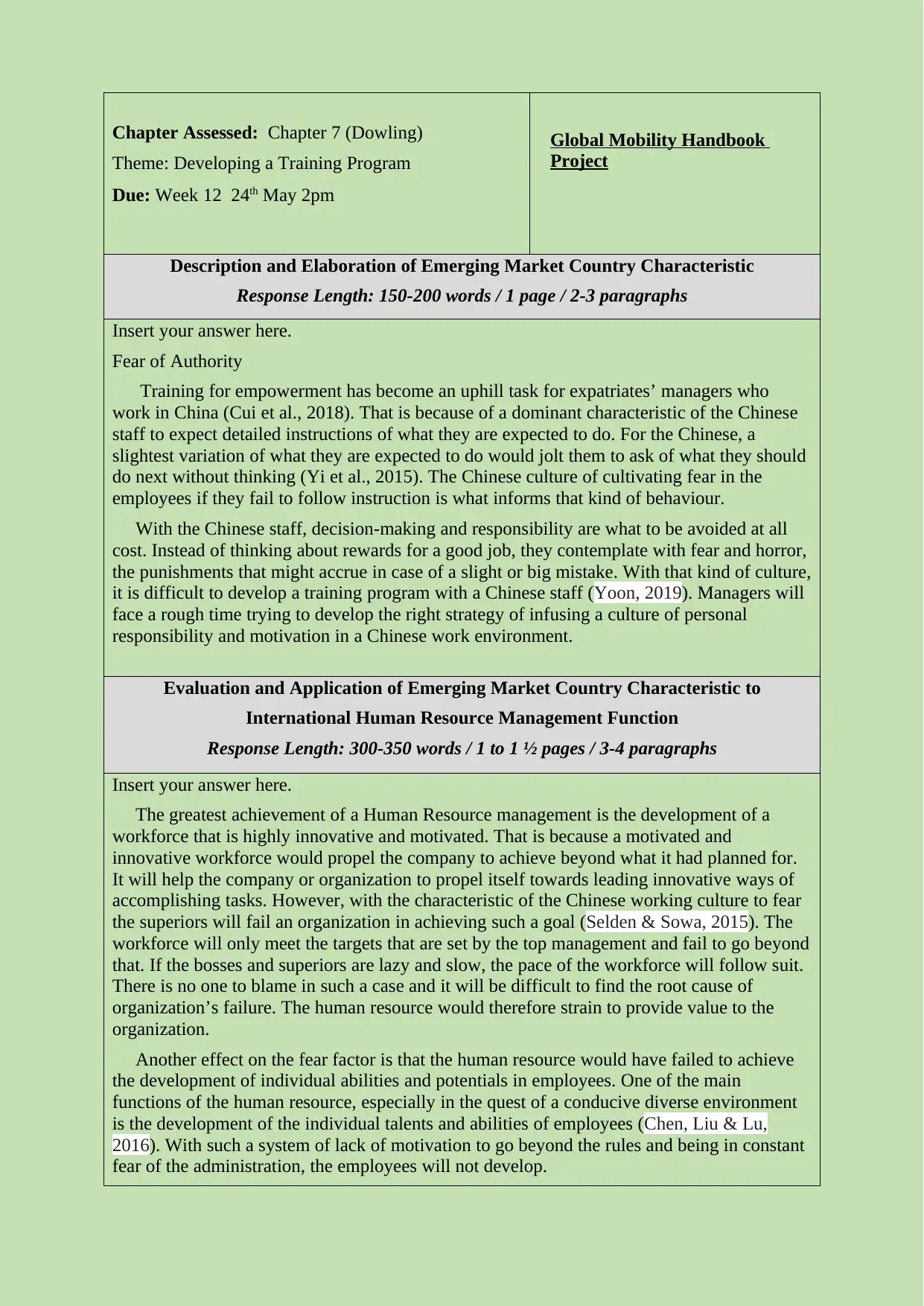
Chapter Assessed: Chapter 7 (Dowling)
Theme: Developing a Training Program
Due: Week 12 24th May 2pm
Global Mobility Handbook
Project
Description and Elaboration of Emerging Market Country Characteristic
Response Length: 150-200 words / 1 page / 2-3 paragraphs
Insert your answer here.
Fear of Authority
Training for empowerment has become an uphill task for expatriates’ managers who
work in China (Cui et al., 2018). That is because of a dominant characteristic of the Chinese
staff to expect detailed instructions of what they are expected to do. For the Chinese, a
slightest variation of what they are expected to do would jolt them to ask of what they should
do next without thinking (Yi et al., 2015). The Chinese culture of cultivating fear in the
employees if they fail to follow instruction is what informs that kind of behaviour.
With the Chinese staff, decision-making and responsibility are what to be avoided at all
cost. Instead of thinking about rewards for a good job, they contemplate with fear and horror,
the punishments that might accrue in case of a slight or big mistake. With that kind of culture,
it is difficult to develop a training program with a Chinese staff (Yoon, 2019). Managers will
face a rough time trying to develop the right strategy of infusing a culture of personal
responsibility and motivation in a Chinese work environment.
Evaluation and Application of Emerging Market Country Characteristic to
International Human Resource Management Function
Response Length: 300-350 words / 1 to 1 ½ pages / 3-4 paragraphs
Insert your answer here.
The greatest achievement of a Human Resource management is the development of a
workforce that is highly innovative and motivated. That is because a motivated and
innovative workforce would propel the company to achieve beyond what it had planned for.
It will help the company or organization to propel itself towards leading innovative ways of
accomplishing tasks. However, with the characteristic of the Chinese working culture to fear
the superiors will fail an organization in achieving such a goal (Selden & Sowa, 2015). The
workforce will only meet the targets that are set by the top management and fail to go beyond
that. If the bosses and superiors are lazy and slow, the pace of the workforce will follow suit.
There is no one to blame in such a case and it will be difficult to find the root cause of
organization’s failure. The human resource would therefore strain to provide value to the
organization.
Another effect on the fear factor is that the human resource would have failed to achieve
the development of individual abilities and potentials in employees. One of the main
functions of the human resource, especially in the quest of a conducive diverse environment
is the development of the individual talents and abilities of employees (Chen, Liu & Lu,
2016). With such a system of lack of motivation to go beyond the rules and being in constant
fear of the administration, the employees will not develop.
Theme: Developing a Training Program
Due: Week 12 24th May 2pm
Global Mobility Handbook
Project
Description and Elaboration of Emerging Market Country Characteristic
Response Length: 150-200 words / 1 page / 2-3 paragraphs
Insert your answer here.
Fear of Authority
Training for empowerment has become an uphill task for expatriates’ managers who
work in China (Cui et al., 2018). That is because of a dominant characteristic of the Chinese
staff to expect detailed instructions of what they are expected to do. For the Chinese, a
slightest variation of what they are expected to do would jolt them to ask of what they should
do next without thinking (Yi et al., 2015). The Chinese culture of cultivating fear in the
employees if they fail to follow instruction is what informs that kind of behaviour.
With the Chinese staff, decision-making and responsibility are what to be avoided at all
cost. Instead of thinking about rewards for a good job, they contemplate with fear and horror,
the punishments that might accrue in case of a slight or big mistake. With that kind of culture,
it is difficult to develop a training program with a Chinese staff (Yoon, 2019). Managers will
face a rough time trying to develop the right strategy of infusing a culture of personal
responsibility and motivation in a Chinese work environment.
Evaluation and Application of Emerging Market Country Characteristic to
International Human Resource Management Function
Response Length: 300-350 words / 1 to 1 ½ pages / 3-4 paragraphs
Insert your answer here.
The greatest achievement of a Human Resource management is the development of a
workforce that is highly innovative and motivated. That is because a motivated and
innovative workforce would propel the company to achieve beyond what it had planned for.
It will help the company or organization to propel itself towards leading innovative ways of
accomplishing tasks. However, with the characteristic of the Chinese working culture to fear
the superiors will fail an organization in achieving such a goal (Selden & Sowa, 2015). The
workforce will only meet the targets that are set by the top management and fail to go beyond
that. If the bosses and superiors are lazy and slow, the pace of the workforce will follow suit.
There is no one to blame in such a case and it will be difficult to find the root cause of
organization’s failure. The human resource would therefore strain to provide value to the
organization.
Another effect on the fear factor is that the human resource would have failed to achieve
the development of individual abilities and potentials in employees. One of the main
functions of the human resource, especially in the quest of a conducive diverse environment
is the development of the individual talents and abilities of employees (Chen, Liu & Lu,
2016). With such a system of lack of motivation to go beyond the rules and being in constant
fear of the administration, the employees will not develop.
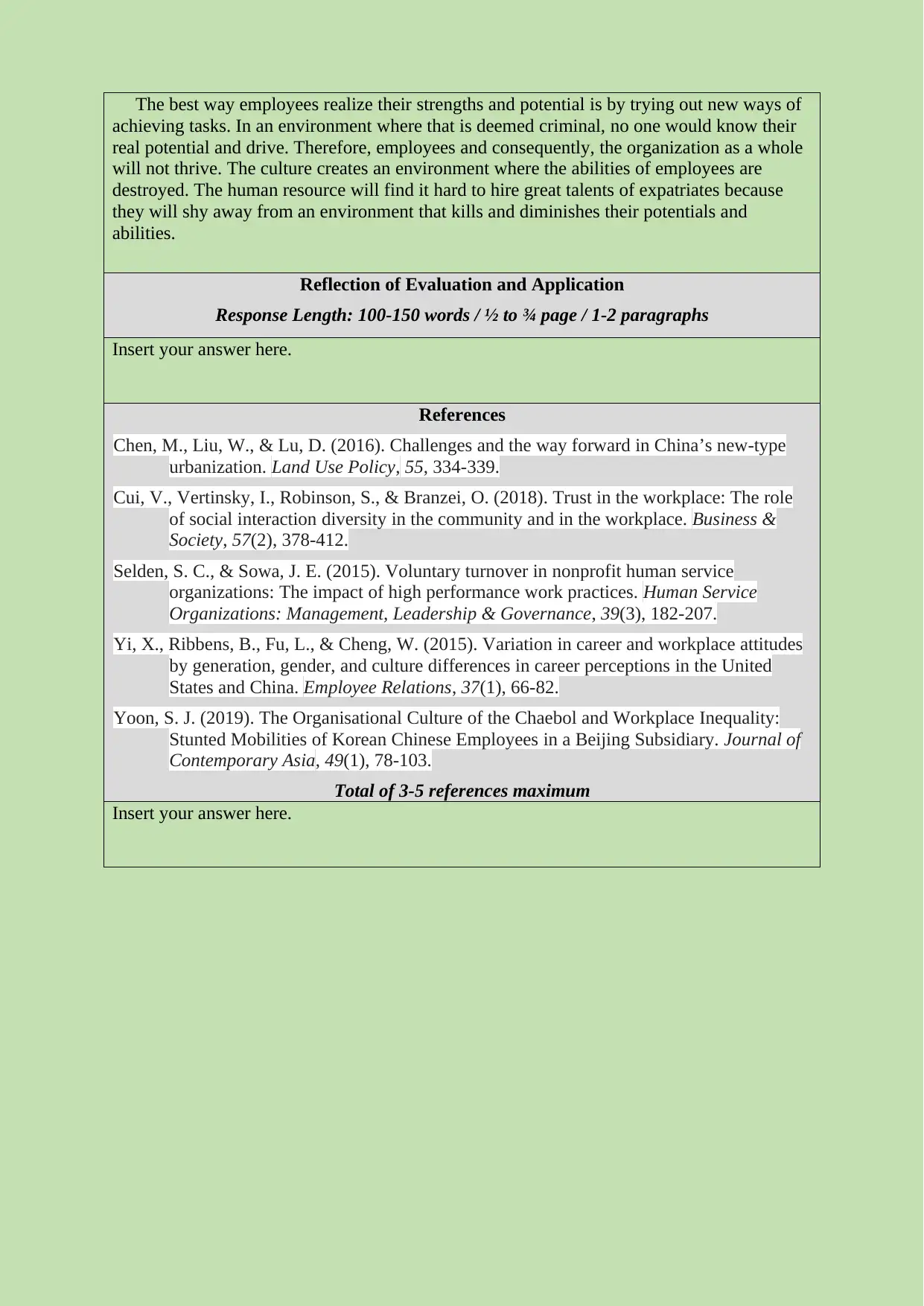
The best way employees realize their strengths and potential is by trying out new ways of
achieving tasks. In an environment where that is deemed criminal, no one would know their
real potential and drive. Therefore, employees and consequently, the organization as a whole
will not thrive. The culture creates an environment where the abilities of employees are
destroyed. The human resource will find it hard to hire great talents of expatriates because
they will shy away from an environment that kills and diminishes their potentials and
abilities.
Reflection of Evaluation and Application
Response Length: 100-150 words / ½ to ¾ page / 1-2 paragraphs
Insert your answer here.
References
Chen, M., Liu, W., & Lu, D. (2016). Challenges and the way forward in China’s new-type
urbanization. Land Use Policy, 55, 334-339.
Cui, V., Vertinsky, I., Robinson, S., & Branzei, O. (2018). Trust in the workplace: The role
of social interaction diversity in the community and in the workplace. Business &
Society, 57(2), 378-412.
Selden, S. C., & Sowa, J. E. (2015). Voluntary turnover in nonprofit human service
organizations: The impact of high performance work practices. Human Service
Organizations: Management, Leadership & Governance, 39(3), 182-207.
Yi, X., Ribbens, B., Fu, L., & Cheng, W. (2015). Variation in career and workplace attitudes
by generation, gender, and culture differences in career perceptions in the United
States and China. Employee Relations, 37(1), 66-82.
Yoon, S. J. (2019). The Organisational Culture of the Chaebol and Workplace Inequality:
Stunted Mobilities of Korean Chinese Employees in a Beijing Subsidiary. Journal of
Contemporary Asia, 49(1), 78-103.
Total of 3-5 references maximum
Insert your answer here.
achieving tasks. In an environment where that is deemed criminal, no one would know their
real potential and drive. Therefore, employees and consequently, the organization as a whole
will not thrive. The culture creates an environment where the abilities of employees are
destroyed. The human resource will find it hard to hire great talents of expatriates because
they will shy away from an environment that kills and diminishes their potentials and
abilities.
Reflection of Evaluation and Application
Response Length: 100-150 words / ½ to ¾ page / 1-2 paragraphs
Insert your answer here.
References
Chen, M., Liu, W., & Lu, D. (2016). Challenges and the way forward in China’s new-type
urbanization. Land Use Policy, 55, 334-339.
Cui, V., Vertinsky, I., Robinson, S., & Branzei, O. (2018). Trust in the workplace: The role
of social interaction diversity in the community and in the workplace. Business &
Society, 57(2), 378-412.
Selden, S. C., & Sowa, J. E. (2015). Voluntary turnover in nonprofit human service
organizations: The impact of high performance work practices. Human Service
Organizations: Management, Leadership & Governance, 39(3), 182-207.
Yi, X., Ribbens, B., Fu, L., & Cheng, W. (2015). Variation in career and workplace attitudes
by generation, gender, and culture differences in career perceptions in the United
States and China. Employee Relations, 37(1), 66-82.
Yoon, S. J. (2019). The Organisational Culture of the Chaebol and Workplace Inequality:
Stunted Mobilities of Korean Chinese Employees in a Beijing Subsidiary. Journal of
Contemporary Asia, 49(1), 78-103.
Total of 3-5 references maximum
Insert your answer here.
Paraphrase This Document
Need a fresh take? Get an instant paraphrase of this document with our AI Paraphraser
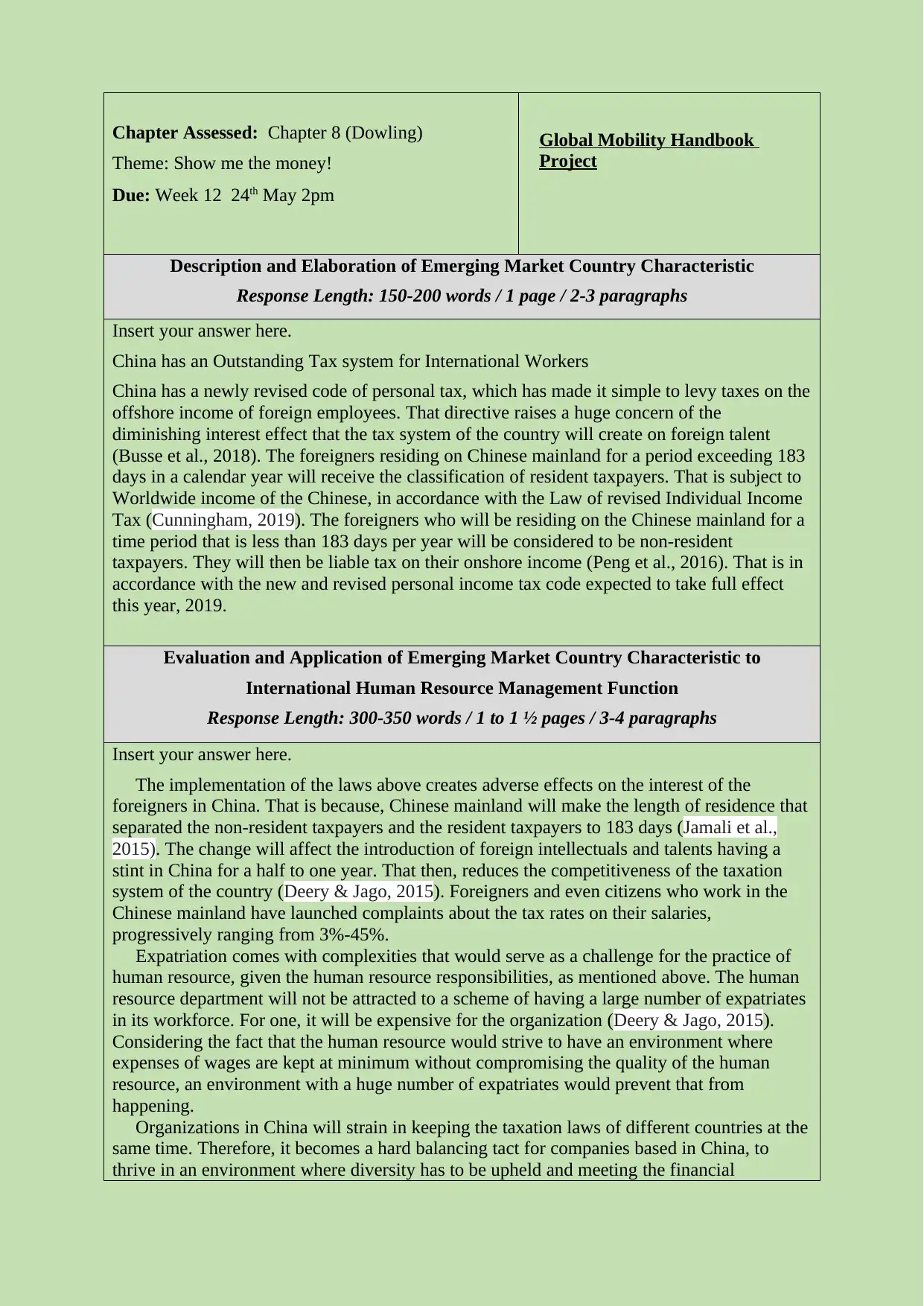
Chapter Assessed: Chapter 8 (Dowling)
Theme: Show me the money!
Due: Week 12 24th May 2pm
Global Mobility Handbook
Project
Description and Elaboration of Emerging Market Country Characteristic
Response Length: 150-200 words / 1 page / 2-3 paragraphs
Insert your answer here.
China has an Outstanding Tax system for International Workers
China has a newly revised code of personal tax, which has made it simple to levy taxes on the
offshore income of foreign employees. That directive raises a huge concern of the
diminishing interest effect that the tax system of the country will create on foreign talent
(Busse et al., 2018). The foreigners residing on Chinese mainland for a period exceeding 183
days in a calendar year will receive the classification of resident taxpayers. That is subject to
Worldwide income of the Chinese, in accordance with the Law of revised Individual Income
Tax (Cunningham, 2019). The foreigners who will be residing on the Chinese mainland for a
time period that is less than 183 days per year will be considered to be non-resident
taxpayers. They will then be liable tax on their onshore income (Peng et al., 2016). That is in
accordance with the new and revised personal income tax code expected to take full effect
this year, 2019.
Evaluation and Application of Emerging Market Country Characteristic to
International Human Resource Management Function
Response Length: 300-350 words / 1 to 1 ½ pages / 3-4 paragraphs
Insert your answer here.
The implementation of the laws above creates adverse effects on the interest of the
foreigners in China. That is because, Chinese mainland will make the length of residence that
separated the non-resident taxpayers and the resident taxpayers to 183 days (Jamali et al.,
2015). The change will affect the introduction of foreign intellectuals and talents having a
stint in China for a half to one year. That then, reduces the competitiveness of the taxation
system of the country (Deery & Jago, 2015). Foreigners and even citizens who work in the
Chinese mainland have launched complaints about the tax rates on their salaries,
progressively ranging from 3%-45%.
Expatriation comes with complexities that would serve as a challenge for the practice of
human resource, given the human resource responsibilities, as mentioned above. The human
resource department will not be attracted to a scheme of having a large number of expatriates
in its workforce. For one, it will be expensive for the organization (Deery & Jago, 2015).
Considering the fact that the human resource would strive to have an environment where
expenses of wages are kept at minimum without compromising the quality of the human
resource, an environment with a huge number of expatriates would prevent that from
happening.
Organizations in China will strain in keeping the taxation laws of different countries at the
same time. Therefore, it becomes a hard balancing tact for companies based in China, to
thrive in an environment where diversity has to be upheld and meeting the financial
Theme: Show me the money!
Due: Week 12 24th May 2pm
Global Mobility Handbook
Project
Description and Elaboration of Emerging Market Country Characteristic
Response Length: 150-200 words / 1 page / 2-3 paragraphs
Insert your answer here.
China has an Outstanding Tax system for International Workers
China has a newly revised code of personal tax, which has made it simple to levy taxes on the
offshore income of foreign employees. That directive raises a huge concern of the
diminishing interest effect that the tax system of the country will create on foreign talent
(Busse et al., 2018). The foreigners residing on Chinese mainland for a period exceeding 183
days in a calendar year will receive the classification of resident taxpayers. That is subject to
Worldwide income of the Chinese, in accordance with the Law of revised Individual Income
Tax (Cunningham, 2019). The foreigners who will be residing on the Chinese mainland for a
time period that is less than 183 days per year will be considered to be non-resident
taxpayers. They will then be liable tax on their onshore income (Peng et al., 2016). That is in
accordance with the new and revised personal income tax code expected to take full effect
this year, 2019.
Evaluation and Application of Emerging Market Country Characteristic to
International Human Resource Management Function
Response Length: 300-350 words / 1 to 1 ½ pages / 3-4 paragraphs
Insert your answer here.
The implementation of the laws above creates adverse effects on the interest of the
foreigners in China. That is because, Chinese mainland will make the length of residence that
separated the non-resident taxpayers and the resident taxpayers to 183 days (Jamali et al.,
2015). The change will affect the introduction of foreign intellectuals and talents having a
stint in China for a half to one year. That then, reduces the competitiveness of the taxation
system of the country (Deery & Jago, 2015). Foreigners and even citizens who work in the
Chinese mainland have launched complaints about the tax rates on their salaries,
progressively ranging from 3%-45%.
Expatriation comes with complexities that would serve as a challenge for the practice of
human resource, given the human resource responsibilities, as mentioned above. The human
resource department will not be attracted to a scheme of having a large number of expatriates
in its workforce. For one, it will be expensive for the organization (Deery & Jago, 2015).
Considering the fact that the human resource would strive to have an environment where
expenses of wages are kept at minimum without compromising the quality of the human
resource, an environment with a huge number of expatriates would prevent that from
happening.
Organizations in China will strain in keeping the taxation laws of different countries at the
same time. Therefore, it becomes a hard balancing tact for companies based in China, to
thrive in an environment where diversity has to be upheld and meeting the financial
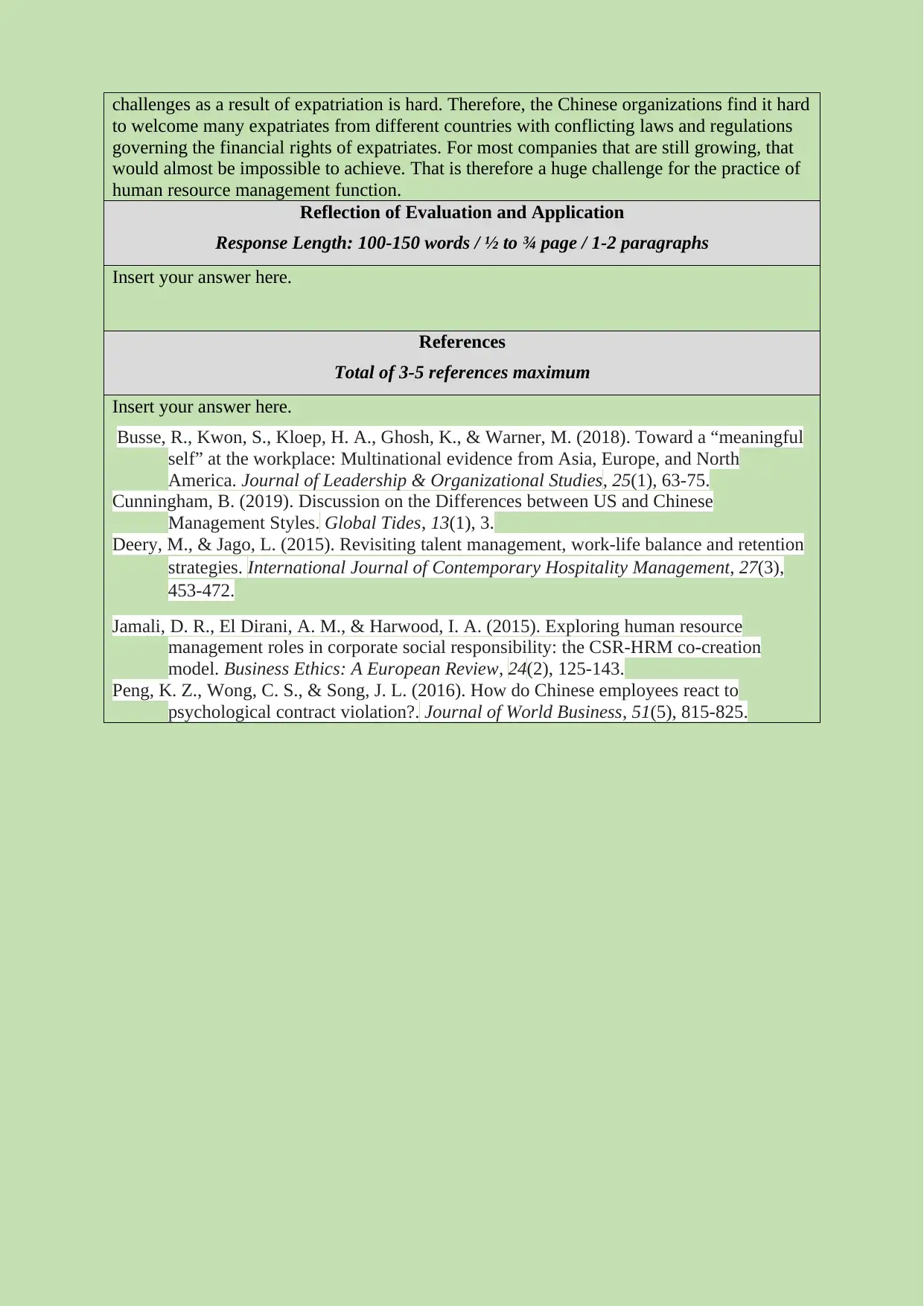
challenges as a result of expatriation is hard. Therefore, the Chinese organizations find it hard
to welcome many expatriates from different countries with conflicting laws and regulations
governing the financial rights of expatriates. For most companies that are still growing, that
would almost be impossible to achieve. That is therefore a huge challenge for the practice of
human resource management function.
Reflection of Evaluation and Application
Response Length: 100-150 words / ½ to ¾ page / 1-2 paragraphs
Insert your answer here.
References
Total of 3-5 references maximum
Insert your answer here.
Busse, R., Kwon, S., Kloep, H. A., Ghosh, K., & Warner, M. (2018). Toward a “meaningful
self” at the workplace: Multinational evidence from Asia, Europe, and North
America. Journal of Leadership & Organizational Studies, 25(1), 63-75.
Cunningham, B. (2019). Discussion on the Differences between US and Chinese
Management Styles. Global Tides, 13(1), 3.
Deery, M., & Jago, L. (2015). Revisiting talent management, work-life balance and retention
strategies. International Journal of Contemporary Hospitality Management, 27(3),
453-472.
Jamali, D. R., El Dirani, A. M., & Harwood, I. A. (2015). Exploring human resource
management roles in corporate social responsibility: the CSR‐HRM co‐creation
model. Business Ethics: A European Review, 24(2), 125-143.
Peng, K. Z., Wong, C. S., & Song, J. L. (2016). How do Chinese employees react to
psychological contract violation?. Journal of World Business, 51(5), 815-825.
to welcome many expatriates from different countries with conflicting laws and regulations
governing the financial rights of expatriates. For most companies that are still growing, that
would almost be impossible to achieve. That is therefore a huge challenge for the practice of
human resource management function.
Reflection of Evaluation and Application
Response Length: 100-150 words / ½ to ¾ page / 1-2 paragraphs
Insert your answer here.
References
Total of 3-5 references maximum
Insert your answer here.
Busse, R., Kwon, S., Kloep, H. A., Ghosh, K., & Warner, M. (2018). Toward a “meaningful
self” at the workplace: Multinational evidence from Asia, Europe, and North
America. Journal of Leadership & Organizational Studies, 25(1), 63-75.
Cunningham, B. (2019). Discussion on the Differences between US and Chinese
Management Styles. Global Tides, 13(1), 3.
Deery, M., & Jago, L. (2015). Revisiting talent management, work-life balance and retention
strategies. International Journal of Contemporary Hospitality Management, 27(3),
453-472.
Jamali, D. R., El Dirani, A. M., & Harwood, I. A. (2015). Exploring human resource
management roles in corporate social responsibility: the CSR‐HRM co‐creation
model. Business Ethics: A European Review, 24(2), 125-143.
Peng, K. Z., Wong, C. S., & Song, J. L. (2016). How do Chinese employees react to
psychological contract violation?. Journal of World Business, 51(5), 815-825.
1 out of 9
Related Documents
Your All-in-One AI-Powered Toolkit for Academic Success.
+13062052269
info@desklib.com
Available 24*7 on WhatsApp / Email
![[object Object]](/_next/static/media/star-bottom.7253800d.svg)
Unlock your academic potential
© 2024 | Zucol Services PVT LTD | All rights reserved.





